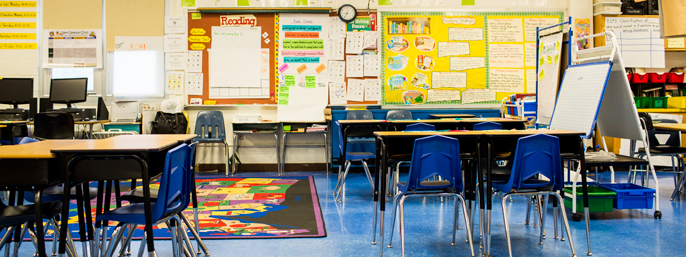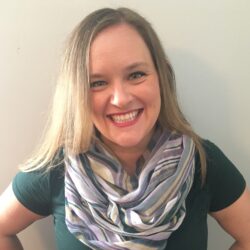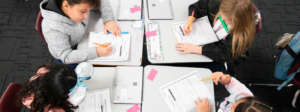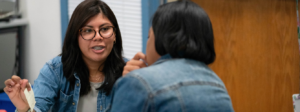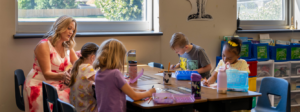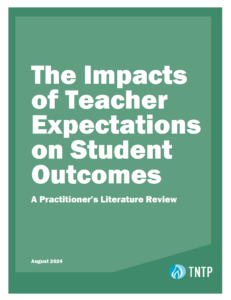Part II: Teacher and Leader Experiences with Pilot and Implementation Support
This is the second in our three-blog series about Appleseeds: Evidence-Based Foundational Skills for Massachusetts, open-source instructional materials based on the Tennessee Foundational Skills Curriculum Supplement (TNFSCS). Click here to read Part I.
In this blog, TNTP Director Maggie Koelbl shares the conversation she had with a panel of teachers and school leaders from Clinton, MA, who participated in the small-group statewide pilot year in 2021-22. The school is implementing the Appleseeds program with their full K-2 team in the 2022-23 school year.
Clinton Public Schools:
- Meghan Silvio, Principal
- Alyssa Piermarini, Assistant Principal
- Melanie Chaves, Kindergarten Teacher
- Chrissy Dobek, First Grade Teacher
- Andrea Abbott, First Grade Teacher
Maggie: How did you and your school leadership team decide to participate in the initial statewide pilot of the TNFSCS?
Alyssa Piermarini, Assistant Principal, Clinton Elementary School: Our principal, Meghan Silvio, and I have been part of the Literacy Leader Network in the Massachusetts Department of Elementary and Secondary Education (DESE) for the last four or five years, and we received an email asking if we wanted to be part of the pilot. We were pretty interested in it, because we had some teachers who were already demonstrating strong, foundational reading skill knowledge in their classrooms, but they had to do a lot of curriculum supplementing with the phonics program we used then. We thought the pilot could be a good support for them, particularly having all the materials they would need in one place. We reached out to three of our amazing teachers, and they were excited to jump on board.
Melanie Chaves, Kindergarten Teacher, Clinton Elementary School: Alyssa and I had a conversation at the end of the 2020-21 school year about the gaps we noticed in the foundational skills curriculum we were using at the time. That year, my goal had been for my kindergarteners to read c-v-c- words [short words with a consonant, vowel, consonant pattern], and they just weren’t – so I was super excited to start something new. We got to do a three-day training at the very end of the year, way before I ever taught it, which was different from how we’ve received training in the past.
Chrissy Dobek, First Grade Teacher, Clinton Elementary School: It was really nice to get that original training for three days, to get comfortable with the materials. It also helped to have the time over the summer to dig into it a little more before we got started.
Alyssa: Early on in the pilot, I was struck by something I had never heard from my teachers before. They consistently said to me, “I just feel like I’m such a better reading teacher now. I actually understand what I need to do to teach kids how to read.” And that was just in the first few months of using these materials! Realizing that they were understanding all the essential components of what kids need to be readers was very eye-opening and exciting from my standpoint, just because there is so much knowledge-building on the teachers’ end that goes into being a good reading teacher. There are so many elements, and the fact that they felt supported in that way caught our attention for sure.
Q: After the initial pilot year, Clinton Elementary School’s entire K-2 team was invited to participate in a district-wide pilot of the Appleseeds materials for the 2022-23 school year. How did your school decide to take this on?
A: Meghan Silvio, Principal, Clinton Elementary School: When Alyssa came to me with that invitation, I said, “No.” I came in as principal of Clinton Elementary in March 2020, and at that time, we were implementing a new curriculum and phonemic awareness program, while also teaching during a pandemic. So you can understand from my perspective, I really didn’t want to ask them to stop those and start something new. Maggie graciously said that our school could participate on an opt-in basis. Clinton is a very big school; we have eight sections of first and second grade, and seven sections of kindergarten. And every single teacher opted into it. Every single teacher willingly volunteered to jump into Appleseeds. And that is a direct result of the way the first-year pilot teachers spoke of the program, and the way they shared their experience with it. They fully believed in it. My staff knew something needed to change for our kids.
I will always and forever be ‘the principal who said no’ to an incredible staff that made the choice to say yes. And I can already see some amazing things happening in our classrooms. You know, foundational reading can sometimes be the hardest, but the engagement that I see in our students – I’m incredibly thankful that our teachers had the courage to jump in and try something new despite their exhaustion.
Q: How has working with TNTP coaches on implementing Appleseeds informed your/your teachers’ foundational skills instructional practice?
Alyssa: Teachers were really able to understand the ‘whys’ behind the elements of Appleseeds. They understand why we are teaching sounds first, why we are teaching explicit phonics, why we are attaching connected text to increase fluency – all those important components of what foundational reading skills are. Also, the fact that we have real-time, on-site opportunities to observe teachers in classrooms, and a built-in continuous coaching cycle, so they get real feedback about what we’re seeing and trends across the building. This is different too, because there are a lot of perspectives on our team that’s doing our walkthroughs.
Andrea Abbott, First Grade Teacher, Clinton Elementary School: I think the difference between Appleseeds implementation and other implementations is that it hasn’t been just an isolated session – it has been continuous from the start. We have monthly meetings where we can look at lesson protocols, practice and observe lessons and give and receive feedback – plus we have virtual office hours with TNTP. Maggie really has been supporting us continuously, not just at an isolated training.
Q: What has been your biggest take-away from the Appleseeds work thus far?
Meghan: This is the first time my kindergarten teachers have said, “This is developmentally appropriate!” I feel that there was so much forethought in the Appleseeds program, that for me is a huge takeaway. We have a very diverse population, and all of our kids are accessing it. I would let anyone walk into any one of my K-2 classes and watch an Appleseeds lesson, because that’s how confident I am in my teachers with this program. They may not feel confident yet, since they’re just starting, but I’m confident you could walk into any room and just be blown away.
Alyssa: I keep saying to Donna [Goldstein at DESE] that I am just praying that Appleseeds spreads like wildfire across Massachusetts. I want it so badly for districts everywhere! When you think about equity, giving teachers tools to teach reading well is what our kids deserve here. I’m just praying that it spreads quickly across the state so that good reading instruction is happening everywhere.
In the final blog of this three-part series, we will hear from teachers and school/district leaders in Monson Public Schools, another Massachusetts district that is implementing the Appleseeds materials with all K-2 teachers during the 2022-23 school year.
